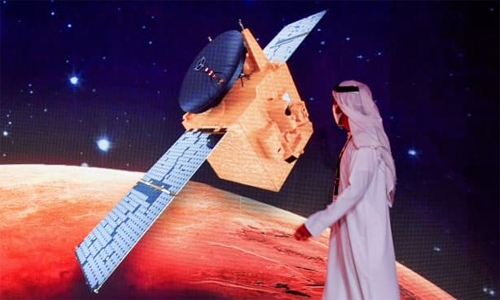UAE becomes the first Arab country to reach Mars
CNBC | Dubai
The Daily Tribune – www.newsofbahrain.com
The United Arab Emirates has made history as the first Arab country to reach Mars.
On Tuesday at 7:42 p.m. local time, the Emirates mars mission named the Hope probe reached the red planet and just over half an hour later, sent its signal back to Earth.
The feat is monumental. Experts estimated the chances of a successful Mars orbit insertion at about 50%, as more than half of all Mars missions actually fail. The crucial time window was a terrifying and suspenseful 27 minutes during which the Hope probe had to dramatically slow down from its speed of 100,000 kilometres per hour (62,137 miles per hour) to 18,000 kph by firing its six thrusters for 27 minutes exactly.
This used up almost half of its fuel, enabling it to be caught by Mars’ gravitational pull and enter into its orbit. There was then a roughly 11-minute communication delay back to Earth as the scientists and engineers involved in the project — which include some 200 Emiratis — waited in tense anticipation to find out whether the mission was a success.
The operation had to be executed with flawless precision, and the stakes high — the current time period during which Earth is closest to the red planet only occurs once every two years.
Six years in the making
The Hope probe, a $200 million project called “Al-Amal” in Arabic, was launched on July 20 from Japan’s Tanegashima Space Station and is now culminating its journey to the red planet. If successful, it will spend one Mars year — equivalent to 687 days on Earth — studying and gathering data on the red planet’s atmosphere. The year 2021 is also significant: It’s the 50th anniversary of the UAE’s formation as a country.
The UAE’s ambitious project is six years in the making and hopes to accomplish a feat that would make it only the fifth country in the world to reach Mars. These missions normally take at least 10 years to design and plan, Sarah al-Amiri, minister of state for advanced technology and chairwoman of the UAE Space Agency, told CNBC’s, Dan Murphy.
“The first of our challenges was designing a mission to another planet for the very first time,” al-Amiri said.
“That included mobilizing our team who has been working on Earth observation satellites, but then filling in and bridging the gaps, because spacecraft that orbit Earth is slightly different from spacecraft that go towards other planets,” she said.
“The challenges were technical in nature, we needed to ensure that that the spacecraft is highly reliable for its journey, it’s able to think for itself, that the components within the spacecraft can operate for the duration of the entire mission,” she added.
Multi-country effort
The Emirates Mars Mission partnered with a team at the University of Colorado Boulder to build the spacecraft, drawing on expertise from the university’s Laboratory for Atmospheric and Space Physics. But the small Gulf country itself has spent years investing in space research and development, founding its own space agency in 2014 after launching satellites in 2009 and 2013 developed jointly with South Korean partners.
The UAE’s government has launched various campaigns to expand the country’s STEM (science, technology, engineering and math) sector, and it views its growing space program as an important part of that. It’s also the first country in the world to have a minister of artificial intelligence and is investing heavily in its own indigenous defence industry.
“This will be our drive from this mission onwards over the course of the next five years: to ensure that there is a very well established and connected globally connected space sector within the Emirates,” al-Amiri said.
Related Posts

